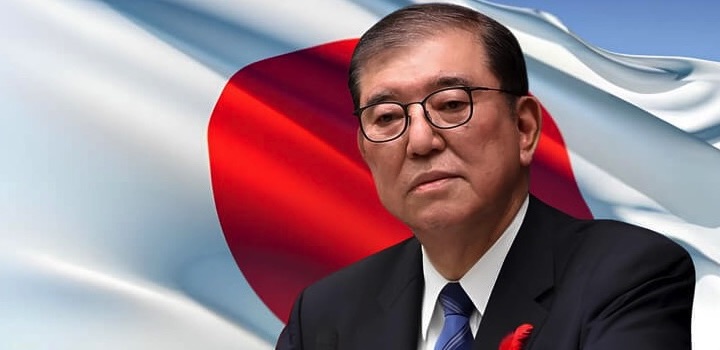In the wake of Russia’s invasion of Ukraine in February 2022, Japan, under then-Prime Minister Fumio Kishida, intensified its commitment to value-based diplomacy—championing the liberal international order and aligning itself with the U.S.-led West.

This approach, rooted in Japan’s postwar identity as a “middle power,” has persisted under Prime Minister Shigeru Ishiba.
Yet, as the United States under President Donald Trump signals a decisive retreat from its traditional leadership role, Japan finds itself at a critical juncture, forced to reconsider its diplomatic strategy amid the unraveling of the very order it has relied upon for security and prosperity.
The Legacy of Defeat and the Logic of Middle Power Diplomacy
Japan’s value-based diplomacy is not an arbitrary choice but a logical extension of its post-World War II trajectory. As a defeated nation stripped of agency in shaping the international order, Japan rebuilt its status through economic prowess, technological innovation, and deft use of soft power. By embedding itself within the liberal order, Japan found a formula that allowed it to regain influence without provoking fears of resurgence among its neighbors or former adversaries.
For decades, this approach seemed to offer a low-cost, high-return strategy. Japan could support Western initiatives—such as imposing sanctions on Russia and providing economic assistance to Ukraine—without direct military entanglement or significant economic sacrifice. Its sanctions on Russia, for example, were largely symbolic given the limited scale of bilateral trade, while continued imports of Russian LNG from Sakhalin were justified as a pragmatic move to prevent Moscow’s deeper alignment with China, Japan’s as well as U.S. primary regional competitor.
The Shadows of History and the Politics of Memory
Japan’s constrained agency is not merely a product of its own choices but also of the persistent efforts by regional powers to keep it in a state of permanent defeat. The “history questions”—from the contentious debates over “comfort women” to the issue of forced labor—have been wielded as tools to undermine Japan’s legitimacy and forestall its return as a great power. These disputes are not just about historical memory but are deeply entwined with the veiled dynamics of regional power politics.
Even Japan’s closest ally, the United States, has been ambivalent about Tokyo’s aspirations. While U.S. policy elites are divided between “Weak Japan” and “Strong Japan” schools, even the latter envision Japan as a junior partner—a supplement and/or a complement to, rather than a rival of, American hegemony. The Obama administration’s handling of historical issues exemplified this ambivalence, often prioritizing regional stability over Japan’s desire for historical vindication or greater autonomy.
The Temptation and Peril of Being a “Victorious Defeated Nation”
History suggests that the only way for a defeated nation to shed its pariah status is to emerge as a victor in a subsequent conflict. Imperial Japan’s ascent after World War I, having sided with the victors with minimal military commitment, is a case in point. The postwar order is always shaped by the winners, who monopolize the narrative of international morality and justice, while the defeated are relegated to the status of underdogs.
For postwar Japan, the U.S.-led liberal international order seemed to offer a unique opportunity: by aligning itself with the West in the global contest against Russia, Japan could hope to be counted among the “winners” without direct involvement in the fighting. This strategy echoed its limited but consequential participation in World War I, which elevated its international standing at minimal cost.
The Retreat of the Liberal Order and the Return of Power Politics
However, the ground beneath Japan’s diplomatic strategy is shifting. The liberal order is in retreat, challenged not only by external adversaries like Russia and China but also by the waning commitment of its chief architect, the United States. As power politics reassert themselves, Japan’s reliance on value-based diplomacy—once an asset—now risks becoming a liability.
Multilateralism, minilateralism, and other soft-power approaches will remain important tools in Japan’s foreign policy arsenal. Yet, the country is entering a period of profound uncertainty, where the old certainties no longer hold. The implicit bargain of the postwar era—that Japan could enjoy security and prosperity by aligning itself with a stable, U.S.-led order—is breaking down.
Redefining Japan’s Geostrategic Posture
Japan now faces a stark choice: cling to a fading order and risk marginalization, or adapt to the new realities of a more fragmented, competitive world. This will require a fundamental reassessment of its geostrategic and diplomatic posture.
Several imperatives stand out:
Strategic Autonomy: Japan must develop greater capacity for independent action, both militarily and diplomatically. This does not mean abandoning alliances, but rather reducing overreliance on any single partner.
Regional Engagement: Tokyo should deepen engagement with regional partners—such as Australia, India, and Southeast Asian nations—who share concerns about China’s rise and the erosion of multilateral norms.
Historical Reconciliation: Proactively addressing historical grievances, rather than allowing them to be weaponized by rivals, will be crucial for building trust and legitimacy in the region.
Economic Resilience: As global supply chains become more politicized, Japan must invest in economic resilience, diversifying sources of energy and critical materials.
Conclusion: Navigating Uncharted Waters
Japan’s value-based diplomacy, forged in the crucible of postwar defeat and nurtured under the umbrella of American power, is at a crossroads. The unraveling of the liberal order exposes the limitations of a strategy premised on stability and consensus. As the world moves inexorably toward greater uncertainty and competition, Japan must summon the will—and the imagination—to redefine its role, not as a permanently defeated nation, but as a proactive shaper of the new order to come.
The choices Tokyo makes in the coming years will determine whether it remains a bystander to history or reclaims agency as a central actor in the evolving drama of international politics.
Author: Masahiro Matsumura – Professor of International Politics and National Security at St. Andrew’s University in Osaka (Momoyama Gakuin Digaku), Japan.
(The views expressed in this article belong only to the author and do not necessarily reflect the views of World Geostrategic Insights).







